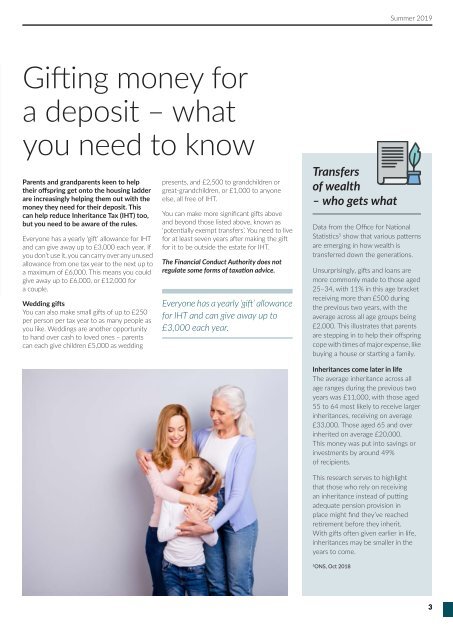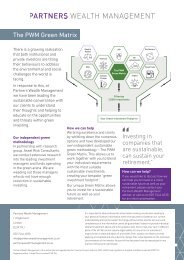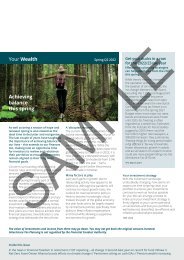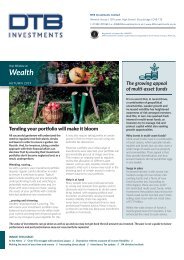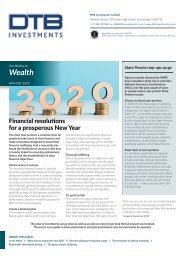DTB Investments Ltd_SummerNewsletter2019
Create successful ePaper yourself
Turn your PDF publications into a flip-book with our unique Google optimized e-Paper software.
Summer 2019<br />
Gifting money for<br />
a deposit – what<br />
you need to know<br />
Parents and grandparents keen to help<br />
their offspring get onto the housing ladder<br />
are increasingly helping them out with the<br />
money they need for their deposit. This<br />
can help reduce Inheritance Tax (IHT) too,<br />
but you need to be aware of the rules.<br />
Everyone has a yearly ‘gift’ allowance for IHT<br />
and can give away up to £3,000 each year. If<br />
you don’t use it, you can carry over any unused<br />
allowance from one tax year to the next up to<br />
a maximum of £6,000. This means you could<br />
give away up to £6,000, or £12,000 for<br />
a couple.<br />
Wedding gifts<br />
You can also make small gifts of up to £250<br />
per person per tax year to as many people as<br />
you like. Weddings are another opportunity<br />
to hand over cash to loved ones – parents<br />
can each give children £5,000 as wedding<br />
presents, and £2,500 to grandchildren or<br />
great-grandchildren, or £1,000 to anyone<br />
else, all free of IHT.<br />
You can make more significant gifts above<br />
and beyond those listed above, known as<br />
‘potentially exempt transfers’. You need to live<br />
for at least seven years after making the gift<br />
for it to be outside the estate for IHT.<br />
The Financial Conduct Authority does not<br />
regulate some forms of taxation advice.<br />
Everyone has a yearly ‘gift’ allowance<br />
for IHT and can give away up to<br />
£3,000 each year.<br />
Transfers<br />
of wealth<br />
– who gets what<br />
Data from the Office for National<br />
Statistics 5 show that various patterns<br />
are emerging in how wealth is<br />
transferred down the generations.<br />
Unsurprisingly, gifts and loans are<br />
more commonly made to those aged<br />
25–34, with 11% in this age bracket<br />
receiving more than £500 during<br />
the previous two years, with the<br />
average across all age groups being<br />
£2,000. This illustrates that parents<br />
are stepping in to help their offspring<br />
cope with times of major expense, like<br />
buying a house or starting a family.<br />
Inheritances come later in life<br />
The average inheritance across all<br />
age ranges during the previous two<br />
years was £11,000, with those aged<br />
55 to 64 most likely to receive larger<br />
inheritances, receiving on average<br />
£33,000. Those aged 65 and over<br />
inherited on average £20,000.<br />
This money was put into savings or<br />
investments by around 49%<br />
of recipients.<br />
This research serves to highlight<br />
that those who rely on receiving<br />
an inheritance instead of putting<br />
adequate pension provision in<br />
place might find they’ve reached<br />
retirement before they inherit.<br />
With gifts often given earlier in life,<br />
inheritances may be smaller in the<br />
years to come.<br />
5<br />
ONS, Oct 2018<br />
3


